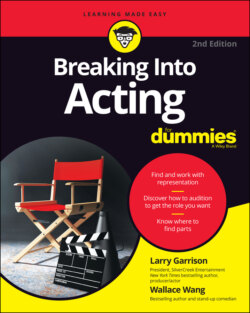Читать книгу Breaking into Acting For Dummies - Larry Garrison - Страница 32
Action: It’s Showtime!
ОглавлениеThe time for rehearsals always runs out too quickly before showtime. That’s when the actors perform for real in front of a live audience or in front of the camera.
Showtime is the pinnacle of all that the cast and crew have worked for. So as an actor, you must try especially hard at this stage to behave professionally, which means showing up on time, being prepared, and doing your job to your best ability. If you do anything that threatens to disrupt a show, you can always be fired at any time.
Sometimes, the best stage actors never make the transition to film and television, while film and television actors may not do as well on the stage as they do in front of the camera. The reason is because film, television, and theater all require different types of acting skills for performing in different environments. With film, you have time to prepare, but television goes much faster. I (Larry) personally was filming a TV series segment with Mark Harmon. Coming from a background with Lee Strasberg, I was using his technique of emotional memory. The producer came up to me and said, “What are you doing?” I responded, “I’m preparing an emotional memory.” He looked at me, laughed, and said, “Throw that away and just say the words.” Ten years of preparation for this moment, and I just said the words.
When performing on many TV shows, such as situation comedies (sitcoms), actors usually perform in front of a live audience while the cameras are rolling at the same time. That way the studio can record the audience’s laughter to play back when the show finally airs, which is called a laugh track.
For films that use special effects, the actors may be required to express intense emotions in a close-up with the camera while staring at nothing at all. During post-production, the director adds in the special effects, such as a computer-generated dinosaur leaping out at the actor or a volcano suddenly erupting in the distance.
An actor may have to respond to another actor who may not appear on camera. Rather than require this other actor to stare at nothing, it’s common courtesy to read your lines off camera to make it easier for the actor on camera to respond to a real person rather than to an imaginary one. If you’re the one on-camera, the other actors may not be as courteous, and you may find yourself trying to react all by yourself while staring at a camera and a blank wall.
